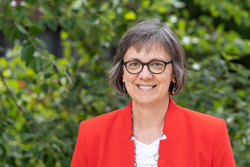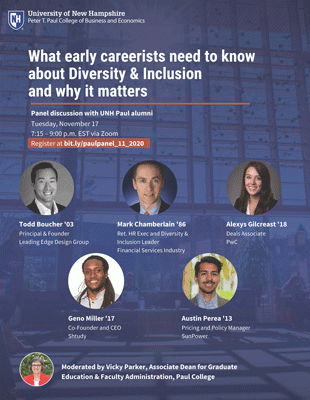Paul Alumni Insights on Diversity & Inclusion

As part of the Paul College Diversity and Inclusion Working Group’s efforts to engage students in learning about diversity and inclusion, five Paul/WSBE alumni were invited to share their thoughts regarding “What early careerists need to know about diversity and inclusion and why it matters” at a panel discussion on November 17, 2020. Students from multiple course sections of introduction to business and behavior in organizations watched the panel in conjunction with course activities, along with other interested community members. You are encouraged to watch the video to get the full impact of this very rich conversation, but for those short on time, here are some key points that emerged in the discussion among the five UNH alumni:

Diversity and Inclusion are two different concepts and need to be understood and tackled as such:
- Diversity – who is here? Not here? What steps are being taken to broaden who is here, both short-term and long-term?
- Inclusion – how do those who are here experience this community – do all feel welcome? Inclusion can and should be tackled RIGHT NOW.
Individuals in the majority (on any dimension – gender, race, sexual orientation), need to:
- celebrate and encourage processes of self-reflection and growth: everyone, especially those of privilege, needs to engage in the introspective process of reflection on DEI and need to be supported doing so
- be willing and able to be open and have difficult conversations and reflect on blind spots
- be able to be vulnerable, to admit that you are wrong
- step up as allies to call people INTO conversation, rather than calling them out, so that they can question their ideas, and their behaviors as well
- be able to build great relationships and build those relationships outside your own comfort zone
Individuals from underrepresented groups at UNH can experience:
- otherness ascribed to BIPOC (Black, Indigenous, and People of Color) in New Hampshire and at UNH, and always being noticed, for better or for worse
- expectations about what it means to be successful, and what success looks like, determined by the dominant group(s)
- the burden of emotional labor necessary related to speaking up, and raising the questions, when racism and other isms appear
What we need to do at Paul/UNH to move the needle:
- make the conversations be not optional – e.g. what are the demographics of X industry that students are walking into? Why is that important?
- take the time, intentionally, to tackle in the curriculum, not just indirectly through representation, have data-driven conversations about equal access to housing, mortgage lending, wealth creation, things like that
- faculty, staff, and student leaders underestimate the impact they can have outside the curriculum by forming relationships with students and raising questions
What needs to happen in workplaces:
- what the C-suite leadership looks like tells people from underrepresented backgrounds a lot about what is possible for them in a particular organization – is the focus on diversity real?
- if the CEO is not taking it seriously, it is not going to trickle down, and that tells you a lot
- DEI efforts need to be happening at every level and part of an organization to bring about the needed systemic changes
- efforts need to be sincere and not opportunistic - can they say Black, gay, comfortably, or are they using these words for the first time?
How do we tackle something that is so big?
- Listen, be willing to be wrong, be uncomfortable
- Bring awareness to our implicit biases – they are there, and we must inquire into them, be conscious of them
- Create structures/events that force those in the majority to get exposure & invite them to affinity events as allies, so they can listen and learn
- Let go of what we are taught about “corporate speak” and saying things indirectly and covering up what you don’t know – you have to engage, have honest conversations, not pretend you know the right answer
- Do more than just your job, be a culture creator/carrier/change agent and contribute to whatever organization you are in, to making it better
- Work both collectively and individually – be politically engaged and VOTE – these are systemic issues and require systemic solutions as well as individual change